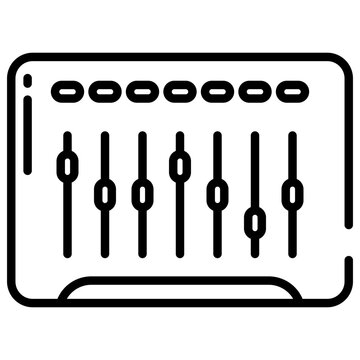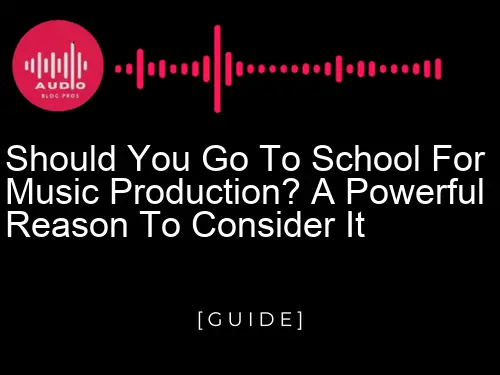Are you considering attending school to become a music producer? Is the thought of going back to school daunting? This blog post will discuss the powerful reasons why attending school to pursue a career in music production may be the right move for you. Read on to find out more and get insight from an experienced music producer!
Table of Contents

What Is Music Production?
Music production is the process of creating and shaping audio recordings. It can encompass everything from recording songs to working on music videos, album liner notes, or soundtracks. Music producers are responsible for all aspects of the creation process, from coming up with an idea to getting the final product recorded and mixed.
The benefits of pursuing a music production degree include:
- Greater understanding and control over your audio recordings
- Improved versatility in the creative industries
- Expansive knowledge base in audio engineering and music theory
- Multimedia abilities that can be applied to any field
What Are the Benefits of Going to School for Music Production?
There are a number of reasons why you might want to consider pursuing a music production program. First, music production can be a very rewarding career field. You may be able to work in the music industry as a producer, mixer, or audio engineer. Second, music production can help you learn new musical skills and develop your own talent as a musician. Third, many music producers find great satisfaction in creating professional-quality recordings. Fourth, there are opportunities to teach music production at various levels throughout the country (or even world). Lastly, many universities offer degree programs in music production. So if you’re interested in pursuing a career as a music producer, it’s important to explore all your options and choose the right program for your goals and interests.
There are several types of school programs that lead to careers as either musicians or producers. These include traditional four-year undergraduate schools such as Berklee College of Music or The University of Texas at Austin School of Music; two-year associate degree programs; vocational/technical schools which haveMusic Production departments; and online degrees offered by some colleges and universities. Allmusic’s review website presents an overview of 50 accredited schools with degrees in Music Production including both undergraduate (Berklee College Of Music) and graduate level programs (New York University Steinhardt School Of Culture And Arts). In terms of city locations most schools prefer major metropolitan areas such as New York City Los Angeles , Chicago , London , Berlin etc., but there is also significant representation from smaller towns and villages scattered throughout America Midwest , Northeast etc.. However what counts more than where someone studies is how passionate they are about their chosen craft combined with hard work during their time studying MUSIC PRODUCTION whether it’s at one of our prestigious institutions listed above or one you discover through individual research… Though based on where someone lived – not where they studied 😉
What Skills Will You Learn in a Music Production Program?
In a music production program, you will learn how to create and produce music. This includes learning how to mix sounds, create melodies, and create beats. You will also learn how to work with other musicians and producers.
The benefits of going to school for music production include:
- You will learn how to create and produce music.
- You will learn how to work with other musicians and producers.
- You will learn how to mix sounds, create melodies, and create beats.
- You will have a strong foundation in music theory.
- You will have the skills necessary to pursue a career in music production.
- Music production programs are available in many colleges and universities across the United States.
- The cost of a music production program varies depending on the school you choose to attend, but it is usually affordable.

How Much Does It Cost to Go to School for Music Production?
The cost of attending a music production program varies depending on the school, but typically it is around $10,000 per year. However, private music production schools may charge significantly more. There are a variety of career opportunities available to music producers after they graduate from a music production program. These include working as a staff producer at a major recording studio, creating and performing electronic music, or becoming an independent musician/producer.
What Are the Career Opportunities for Music Producers?
Degrees for Music Producers
There are a number of different career paths you can take as a music producer. Here are some of the most common:
- Producer
- Engineer
- Music Editor
- Sound Engineer
- Music publisher
There is no one right way to become a music producer, so it’s important to explore all your options and see what works best for you. You can start out in one of these careers, or move into another area later on if you find that this isn’t the right path for you. Some people go to school for music production, while others learn on their own by reading books and learning from other producers. The important thing is toinvest time and effort into your education, because there are many opportunities available to those who know how to produce music.
Some common degrees you may want to consider if you want to become a music producer are:
- Music Production from a college or university
- Audio Engineering from a college or university
- Music Business from a college or university
Employment Opportunities for Music Producers
Music production is a very versatile and in-demand field that can provide you with a variety of career opportunities. There are many music producers who work in the music industry as freelance producers, or in staff positions at music companies or recording studios.
There are also many music producers who work as independent artists, creating and releasing their own music. This can be a very lucrative career, as independent artists can often earn a lot more money than they would working in a staff position at a music company.
Another career option for music producers is to teach music production. This can be a great way to combine your love of music with your passion for teaching. There are many colleges and universities that offer music production courses, and teaching is a very rewarding career.
Networking Benefits of Going to School for Music Production
There are many career opportunities for music producers. The most common way to become a music producer is to get a degree in music production. However, there are other ways to become a music producer. Some people become music producers by working as interns or in the industry. Others become music producers by starting their own music production company.
The benefits of going to school for music production include networking opportunities. Going to school gives you the opportunity to meet people in the industry and learn about the business of music production. Additionally, going to school can give you the skills you need to produce quality music.
Financial Support and Resources Available Through College Programs
Many music producers believe that college is the best place to get a formal education and gain the skills needed to produce quality music. Colleges offer programs in both music theory and production, as well as audio engineering and music business. Aside from formal education, many colleges have thriving music programs that offer extra-curricular activities such as concerts, studio time, recording opportunities and more. Additionally, many colleges offer financial assistance for students pursuing a degree in music production. The following are some of the specific benefits of attending college for music production:
- College educates students in both theory and practical application of musical concepts.
- Many colleges have thriving Music Production Programs with ample resources available such as studios, instrument rental facilities, professional audio equipment, and more.
- College degrees provide considerable financial benefits such as increased job prospects, higher salaries, and more.
- Colleges offer a variety of extra-curricular activities such as concerts, studio time, recording opportunities and more that can be beneficial in developing both musical skills and work experience.

What Are the Different Types of Music Production Programs?
There are a variety of music production programs available, so it is important to choose the one that is best suited for your needs. Some programs focus on theory, while others teach you how to produce music. Some programs also offer internship opportunities, which can help you gain experience in the music industry.

Making the Decision: Should You Go to School for Music Production?
If you’re interested in pursuing a career in music production, there are a few things you’ll need to know. First and foremost, music production is a skilled profession that requires a lot of technical knowledge and creativity. In fact, many music producers work in a variety of industries, including advertising, film, and video games.
Beyond the technical skills required for music production, many programs also teach you how to work with other professionals in the music industry. This includes learning how to pitch songs to studios, market your music, and deal with copyright issues. In addition, many programs also offer courses in audio engineering and songwriting.
Ultimately, the decision whether or not to go to school for music production is up to you. However, if you’re interested in pursuing a career in this field, it’s important to consider the benefits of attending a program. In addition to learning essential skills, school may also give you the opportunity to network with other professionals in the music industry. Finally, many music production programs offer scholarships or financial assistance for students who need it.
In conclusion, music production is a fascinating and rewarding field that requires dedication and knowledge. Whether you choose to pursue it in school or on your own, it’s important to understand what you’ll be expected to learn and how much money it will cost. If you are determined to break into the music industry, going to school for music production could become an invaluable asset.
If this article has piqued your interest in pursuing this career path, check out our other content on the topic of music production! We have plenty of resources to help you make the best decision for your future.

